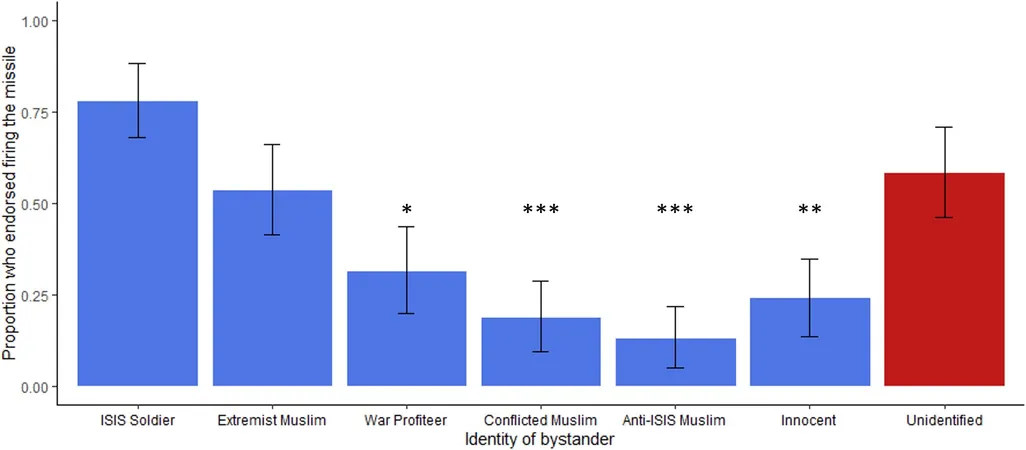
Shocking Study Reveals War Zone Perceptions: Are We Sacrificing Innocents as 'Collateral Damage'?
2024-10-23
Author: Rajesh
Groundbreaking Study on War Zone Perceptions
A groundbreaking study published on October 23, 2024, in the renowned journal PLOS ONE, unveils a startling reality: many people unconsciously view unidentified bystanders in war zones as combatants, thereby justifying their potential sacrifice as 'acceptable collateral damage.' This research led by Scott Danielson from the University of Canterbury, New Zealand, alongside a team of colleagues, sheds light on the alarming bias that could lead to the tragic loss of innocent lives during military operations.
Civilian Casualties and Accountability
Annually, nearly as many civilians are killed as soldiers in conflicts worldwide, often during military strikes intended for enemy combatants. While some cases of mistaken identity have made headlines, countless more incidents remain unreported, highlighting a crucial gap in the accountability surrounding civilian casualties.
Experiments and Findings
In a series of five well-structured experiments involving 2,204 participants faced with a moral quandary—where a military pilot must choose whether to bomb a dangerous enemy target while risking the life of a bystander—the results were thought-provoking. The researchers initially set their scenarios in a conflict between U.S. forces and ISIS in Iraq.
When participants knew that a bystander was an innocent civilian, support for the bombing dwindled significantly. However, when the bystander's identity was obscured, support for the bombing more than doubled.
Perhaps most alarming, about 50% of American participants were willing to endorse the bombing of an unidentified bystander, marking a sacrificial rate higher than for all known targets, save for confirmed enemy combatants. Three additional experiments in a fictitious war context revealed a consistent trend in judgments reflecting this bias.
Link to Total War Concept and National Differences
The likelihood of bombing support was closely linked to participants' views on the concept of total war, which posits that military efforts should disregard the distinction between military and civilian targets. National differences also emerged: participants in the U.K. demonstrated a lower endorsement for bombing compared to their U.S. counterparts, suggesting deep-seated cultural attitudes toward warfare influence these dangerous assumptions.
Implications for Military Strategy and Ethics
The implications of this study are profound for military strategists faced with ethical decisions about engaging targets that may include unknown bystanders. The findings imply a widespread human tendency to assume that unidentified individuals are foes, which could lead to tragic mistakes, especially in the fog of war where the stakes are incredibly high.
A Call for Re-examination of Military Conduct
This research is pressing and timely, especially as modern warfare tactics evolve and civilian casualties continue to rise. The study’s authors emphasize a crucial need for further exploration into reducing this cognitive bias among decision-makers to better differentiate between military targets and innocent lives.
They highlight that while less than 25% of Americans support strikes leading to civilian deaths, this support significantly increases, to 53%, when the bystander is categorized as 'unidentified.' This alarming statistic reveals how easily the line can be blurred in the chaotic reality of armed conflict.
Conclusion: Urgent Need for Ethical Reevaluation
As the world grapples with the devastating consequences of warfare, these insights underline the urgent need for a re-examination of military conduct and ethics to prevent further loss of innocent lives. How many more lives must be sacrificed before we challenge our assumptions about who resides in the combat zones?



 Brasil (PT)
Brasil (PT)
 Canada (EN)
Canada (EN)
 Chile (ES)
Chile (ES)
 España (ES)
España (ES)
 France (FR)
France (FR)
 Hong Kong (EN)
Hong Kong (EN)
 Italia (IT)
Italia (IT)
 日本 (JA)
日本 (JA)
 Magyarország (HU)
Magyarország (HU)
 Norge (NO)
Norge (NO)
 Polska (PL)
Polska (PL)
 Schweiz (DE)
Schweiz (DE)
 Singapore (EN)
Singapore (EN)
 Sverige (SV)
Sverige (SV)
 Suomi (FI)
Suomi (FI)
 Türkiye (TR)
Türkiye (TR)